Business Health Check Report: Travelodge Business Analysis
VerifiedAdded on 2021/02/19
|23
|6391
|234
Report
AI Summary
This report provides a comprehensive business health check of Travelodge, a UK-based hospitality chain. It begins with an introduction outlining the objectives of the business health check, which includes evaluating factors influencing business performance and identifying areas for improvement. The report then delves into Travelodge's business objectives, aligning them with the SMART criteria, and analyzes the internal and external factors influencing the business using SWOT, PESTLE, and Porter's Five Forces models. The SWOT analysis highlights Travelodge's strengths (affordable prices), weaknesses (limited services), opportunities (global expansion), and threats (competition). The PESTLE analysis examines political, economic, social, technological, legal, and environmental factors impacting the business. Porter's Five Forces model assesses competitive forces, new entrants, supplier power, customer power, and threats of substitute products. The report concludes with a discussion of potential improvements to business operations, including market penetration and development strategies, and a plan to evaluate and develop the skills of management and staff to enhance overall business performance and growth. The report also includes a conclusion and references.
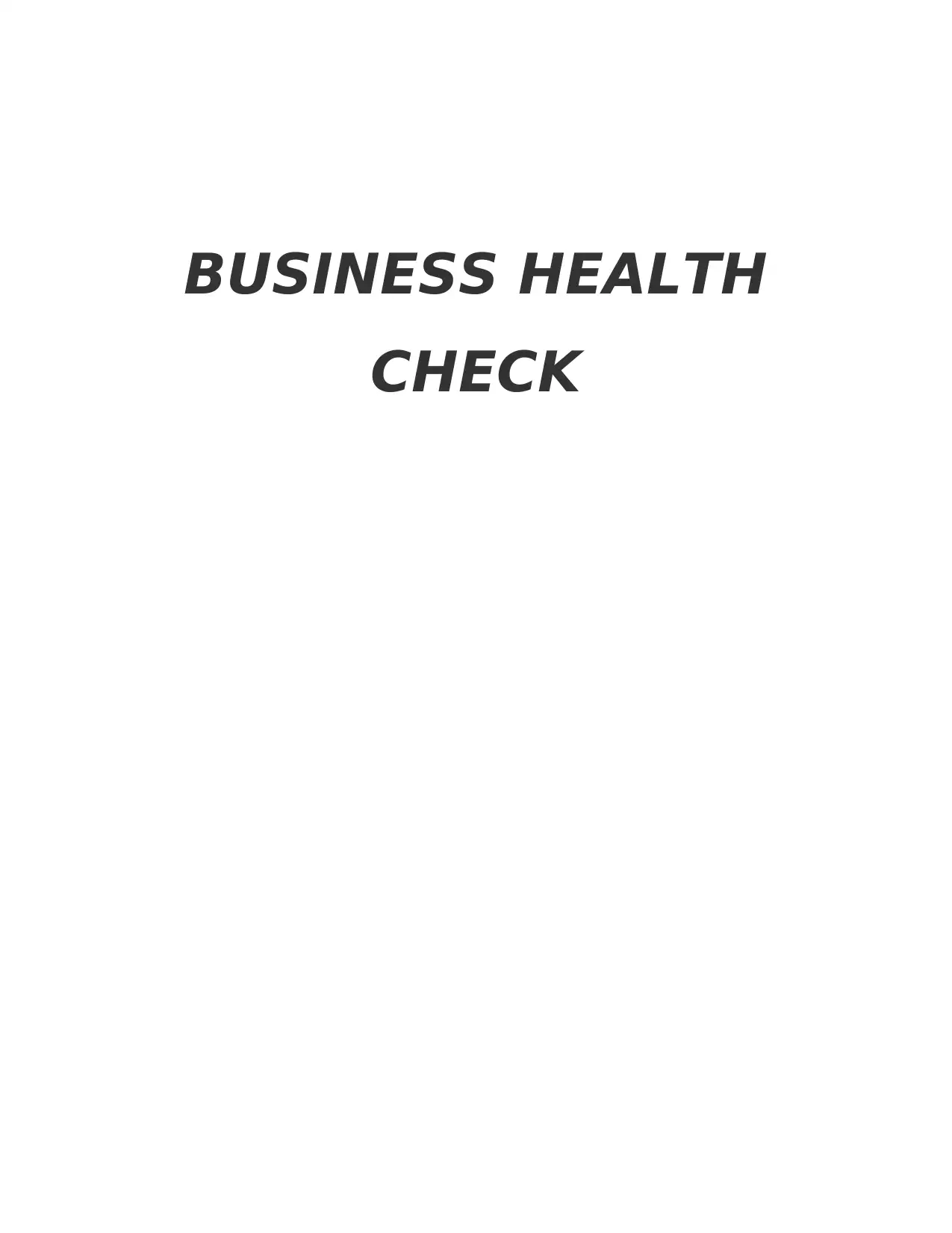
BUSINESS HEALTH
CHECK
CHECK
Paraphrase This Document
Need a fresh take? Get an instant paraphrase of this document with our AI Paraphraser
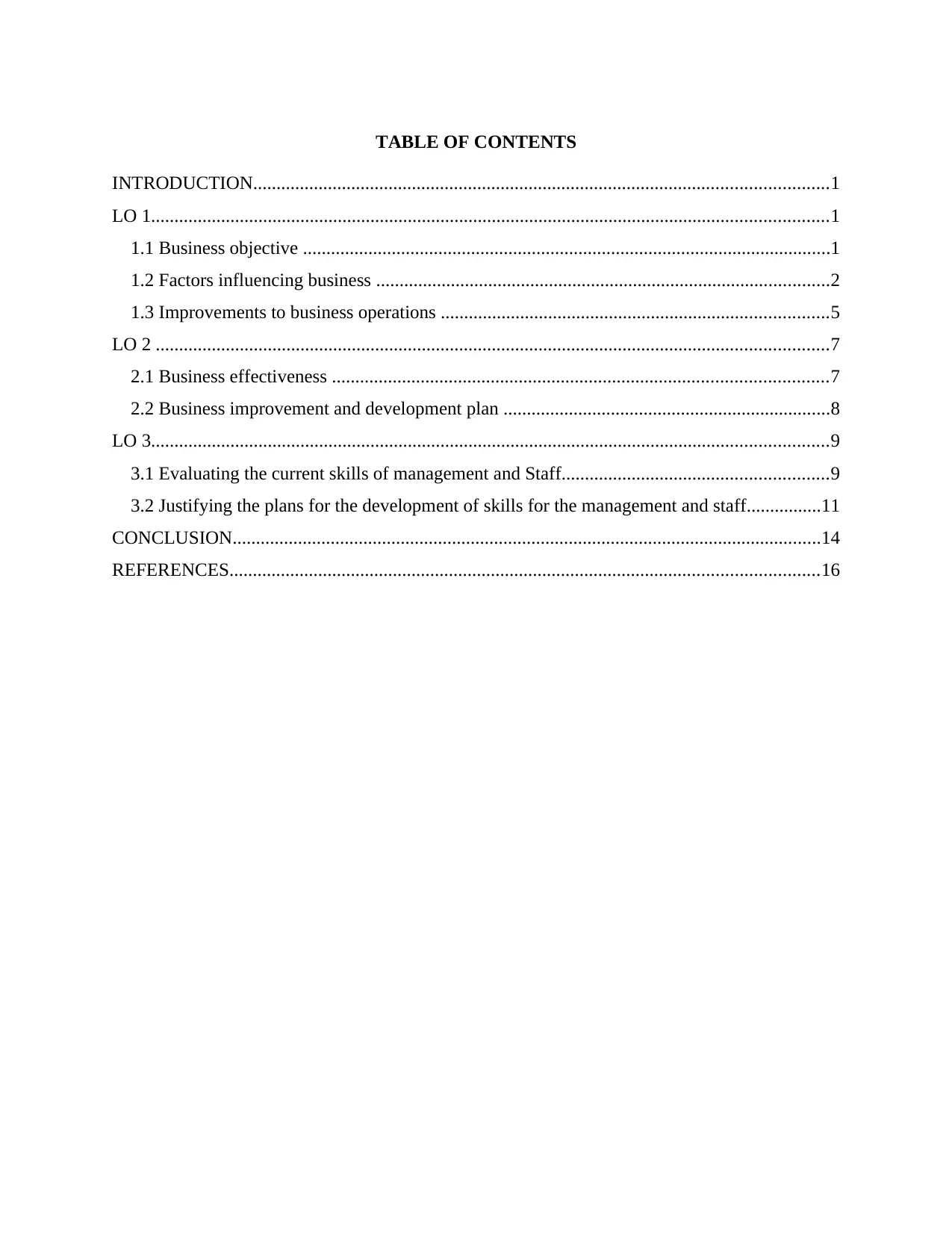
TABLE OF CONTENTS
INTRODUCTION...........................................................................................................................1
LO 1.................................................................................................................................................1
1.1 Business objective .................................................................................................................1
1.2 Factors influencing business .................................................................................................2
1.3 Improvements to business operations ...................................................................................5
LO 2 ................................................................................................................................................7
2.1 Business effectiveness ..........................................................................................................7
2.2 Business improvement and development plan ......................................................................8
LO 3.................................................................................................................................................9
3.1 Evaluating the current skills of management and Staff.........................................................9
3.2 Justifying the plans for the development of skills for the management and staff................11
CONCLUSION..............................................................................................................................14
REFERENCES..............................................................................................................................16
INTRODUCTION...........................................................................................................................1
LO 1.................................................................................................................................................1
1.1 Business objective .................................................................................................................1
1.2 Factors influencing business .................................................................................................2
1.3 Improvements to business operations ...................................................................................5
LO 2 ................................................................................................................................................7
2.1 Business effectiveness ..........................................................................................................7
2.2 Business improvement and development plan ......................................................................8
LO 3.................................................................................................................................................9
3.1 Evaluating the current skills of management and Staff.........................................................9
3.2 Justifying the plans for the development of skills for the management and staff................11
CONCLUSION..............................................................................................................................14
REFERENCES..............................................................................................................................16
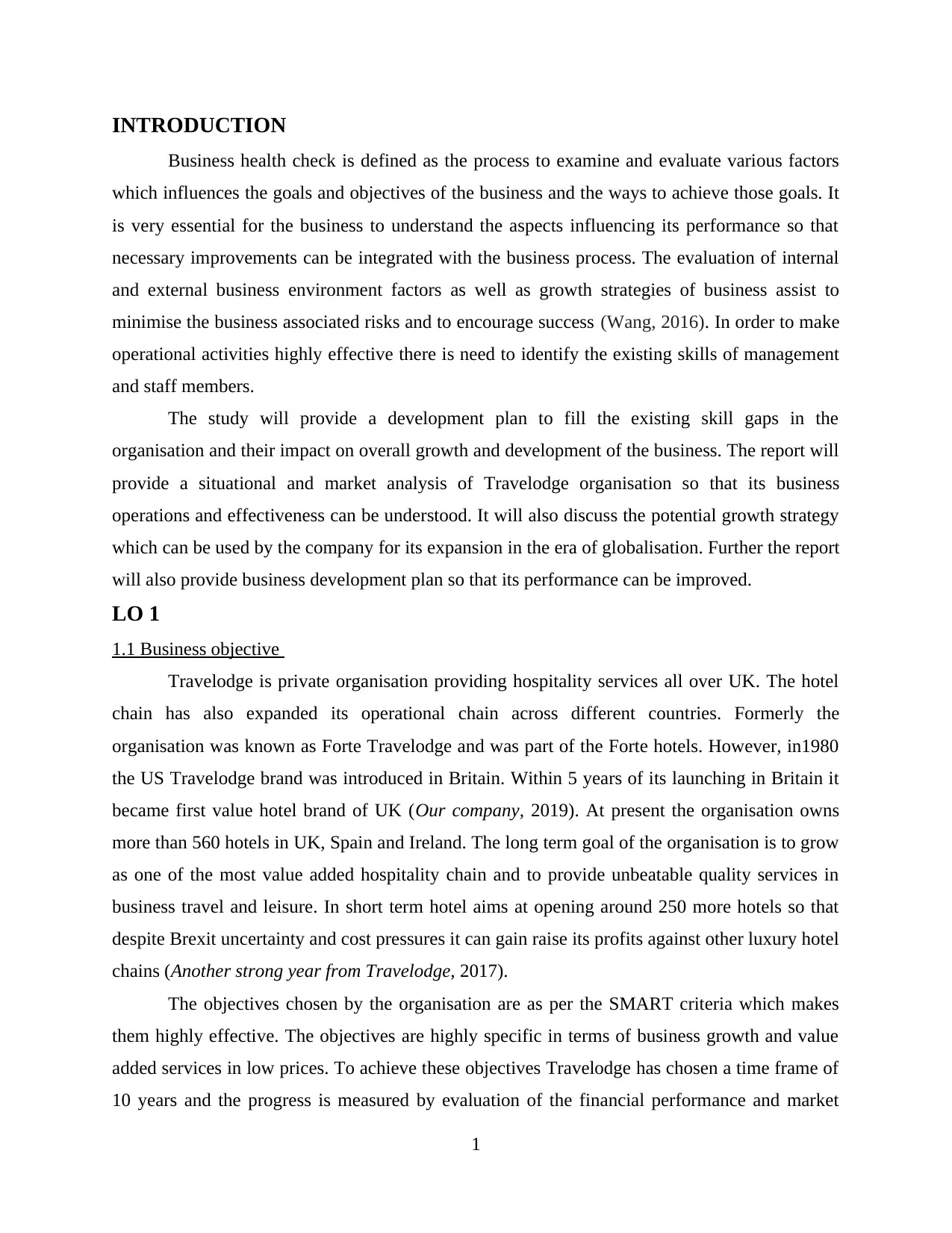
INTRODUCTION
Business health check is defined as the process to examine and evaluate various factors
which influences the goals and objectives of the business and the ways to achieve those goals. It
is very essential for the business to understand the aspects influencing its performance so that
necessary improvements can be integrated with the business process. The evaluation of internal
and external business environment factors as well as growth strategies of business assist to
minimise the business associated risks and to encourage success (Wang, 2016). In order to make
operational activities highly effective there is need to identify the existing skills of management
and staff members.
The study will provide a development plan to fill the existing skill gaps in the
organisation and their impact on overall growth and development of the business. The report will
provide a situational and market analysis of Travelodge organisation so that its business
operations and effectiveness can be understood. It will also discuss the potential growth strategy
which can be used by the company for its expansion in the era of globalisation. Further the report
will also provide business development plan so that its performance can be improved.
LO 1
1.1 Business objective
Travelodge is private organisation providing hospitality services all over UK. The hotel
chain has also expanded its operational chain across different countries. Formerly the
organisation was known as Forte Travelodge and was part of the Forte hotels. However, in1980
the US Travelodge brand was introduced in Britain. Within 5 years of its launching in Britain it
became first value hotel brand of UK (Our company, 2019). At present the organisation owns
more than 560 hotels in UK, Spain and Ireland. The long term goal of the organisation is to grow
as one of the most value added hospitality chain and to provide unbeatable quality services in
business travel and leisure. In short term hotel aims at opening around 250 more hotels so that
despite Brexit uncertainty and cost pressures it can gain raise its profits against other luxury hotel
chains (Another strong year from Travelodge, 2017).
The objectives chosen by the organisation are as per the SMART criteria which makes
them highly effective. The objectives are highly specific in terms of business growth and value
added services in low prices. To achieve these objectives Travelodge has chosen a time frame of
10 years and the progress is measured by evaluation of the financial performance and market
1
Business health check is defined as the process to examine and evaluate various factors
which influences the goals and objectives of the business and the ways to achieve those goals. It
is very essential for the business to understand the aspects influencing its performance so that
necessary improvements can be integrated with the business process. The evaluation of internal
and external business environment factors as well as growth strategies of business assist to
minimise the business associated risks and to encourage success (Wang, 2016). In order to make
operational activities highly effective there is need to identify the existing skills of management
and staff members.
The study will provide a development plan to fill the existing skill gaps in the
organisation and their impact on overall growth and development of the business. The report will
provide a situational and market analysis of Travelodge organisation so that its business
operations and effectiveness can be understood. It will also discuss the potential growth strategy
which can be used by the company for its expansion in the era of globalisation. Further the report
will also provide business development plan so that its performance can be improved.
LO 1
1.1 Business objective
Travelodge is private organisation providing hospitality services all over UK. The hotel
chain has also expanded its operational chain across different countries. Formerly the
organisation was known as Forte Travelodge and was part of the Forte hotels. However, in1980
the US Travelodge brand was introduced in Britain. Within 5 years of its launching in Britain it
became first value hotel brand of UK (Our company, 2019). At present the organisation owns
more than 560 hotels in UK, Spain and Ireland. The long term goal of the organisation is to grow
as one of the most value added hospitality chain and to provide unbeatable quality services in
business travel and leisure. In short term hotel aims at opening around 250 more hotels so that
despite Brexit uncertainty and cost pressures it can gain raise its profits against other luxury hotel
chains (Another strong year from Travelodge, 2017).
The objectives chosen by the organisation are as per the SMART criteria which makes
them highly effective. The objectives are highly specific in terms of business growth and value
added services in low prices. To achieve these objectives Travelodge has chosen a time frame of
10 years and the progress is measured by evaluation of the financial performance and market
1
⊘ This is a preview!⊘
Do you want full access?
Subscribe today to unlock all pages.

Trusted by 1+ million students worldwide
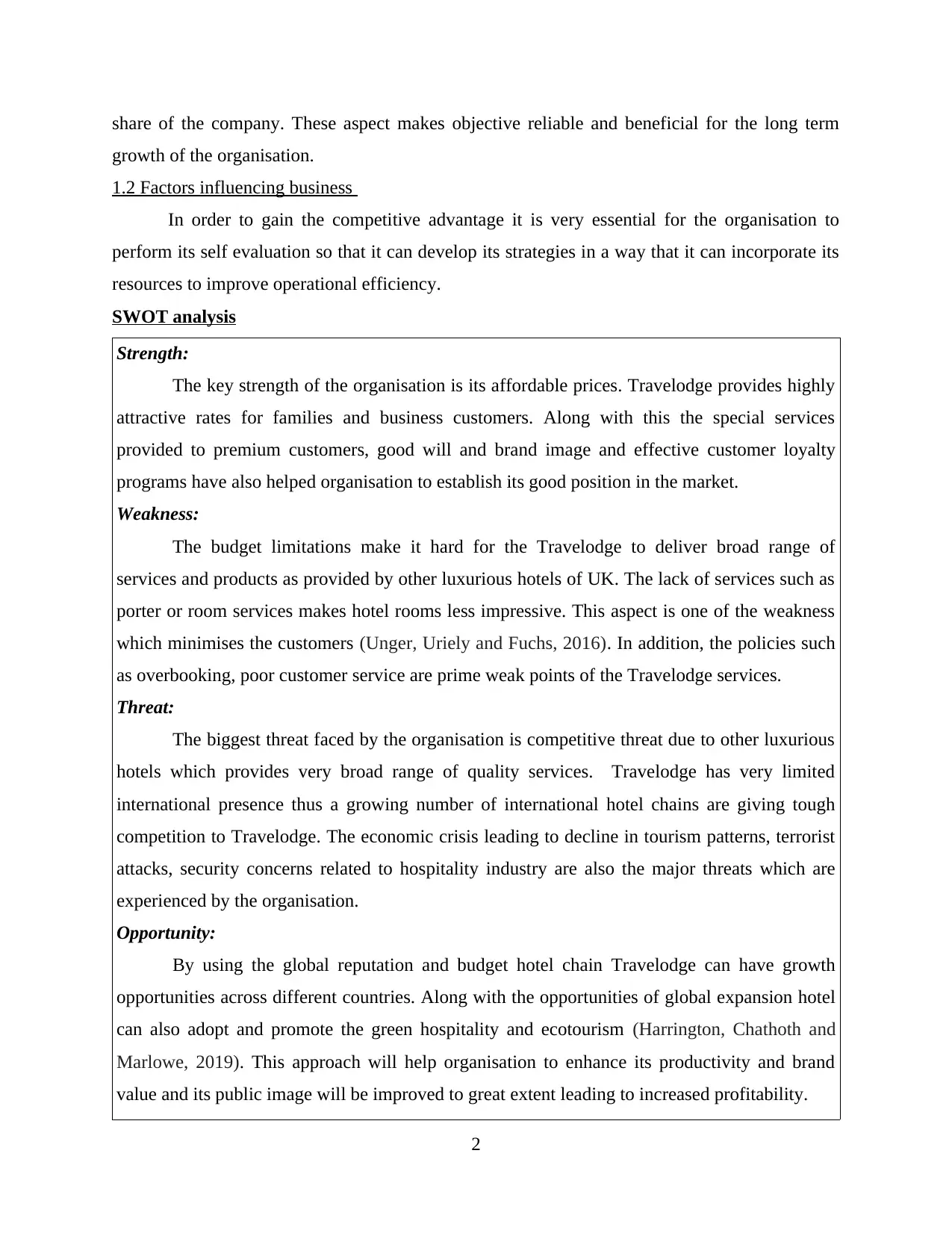
share of the company. These aspect makes objective reliable and beneficial for the long term
growth of the organisation.
1.2 Factors influencing business
In order to gain the competitive advantage it is very essential for the organisation to
perform its self evaluation so that it can develop its strategies in a way that it can incorporate its
resources to improve operational efficiency.
SWOT analysis
Strength:
The key strength of the organisation is its affordable prices. Travelodge provides highly
attractive rates for families and business customers. Along with this the special services
provided to premium customers, good will and brand image and effective customer loyalty
programs have also helped organisation to establish its good position in the market.
Weakness:
The budget limitations make it hard for the Travelodge to deliver broad range of
services and products as provided by other luxurious hotels of UK. The lack of services such as
porter or room services makes hotel rooms less impressive. This aspect is one of the weakness
which minimises the customers (Unger, Uriely and Fuchs, 2016). In addition, the policies such
as overbooking, poor customer service are prime weak points of the Travelodge services.
Threat:
The biggest threat faced by the organisation is competitive threat due to other luxurious
hotels which provides very broad range of quality services. Travelodge has very limited
international presence thus a growing number of international hotel chains are giving tough
competition to Travelodge. The economic crisis leading to decline in tourism patterns, terrorist
attacks, security concerns related to hospitality industry are also the major threats which are
experienced by the organisation.
Opportunity:
By using the global reputation and budget hotel chain Travelodge can have growth
opportunities across different countries. Along with the opportunities of global expansion hotel
can also adopt and promote the green hospitality and ecotourism (Harrington, Chathoth and
Marlowe, 2019). This approach will help organisation to enhance its productivity and brand
value and its public image will be improved to great extent leading to increased profitability.
2
growth of the organisation.
1.2 Factors influencing business
In order to gain the competitive advantage it is very essential for the organisation to
perform its self evaluation so that it can develop its strategies in a way that it can incorporate its
resources to improve operational efficiency.
SWOT analysis
Strength:
The key strength of the organisation is its affordable prices. Travelodge provides highly
attractive rates for families and business customers. Along with this the special services
provided to premium customers, good will and brand image and effective customer loyalty
programs have also helped organisation to establish its good position in the market.
Weakness:
The budget limitations make it hard for the Travelodge to deliver broad range of
services and products as provided by other luxurious hotels of UK. The lack of services such as
porter or room services makes hotel rooms less impressive. This aspect is one of the weakness
which minimises the customers (Unger, Uriely and Fuchs, 2016). In addition, the policies such
as overbooking, poor customer service are prime weak points of the Travelodge services.
Threat:
The biggest threat faced by the organisation is competitive threat due to other luxurious
hotels which provides very broad range of quality services. Travelodge has very limited
international presence thus a growing number of international hotel chains are giving tough
competition to Travelodge. The economic crisis leading to decline in tourism patterns, terrorist
attacks, security concerns related to hospitality industry are also the major threats which are
experienced by the organisation.
Opportunity:
By using the global reputation and budget hotel chain Travelodge can have growth
opportunities across different countries. Along with the opportunities of global expansion hotel
can also adopt and promote the green hospitality and ecotourism (Harrington, Chathoth and
Marlowe, 2019). This approach will help organisation to enhance its productivity and brand
value and its public image will be improved to great extent leading to increased profitability.
2
Paraphrase This Document
Need a fresh take? Get an instant paraphrase of this document with our AI Paraphraser
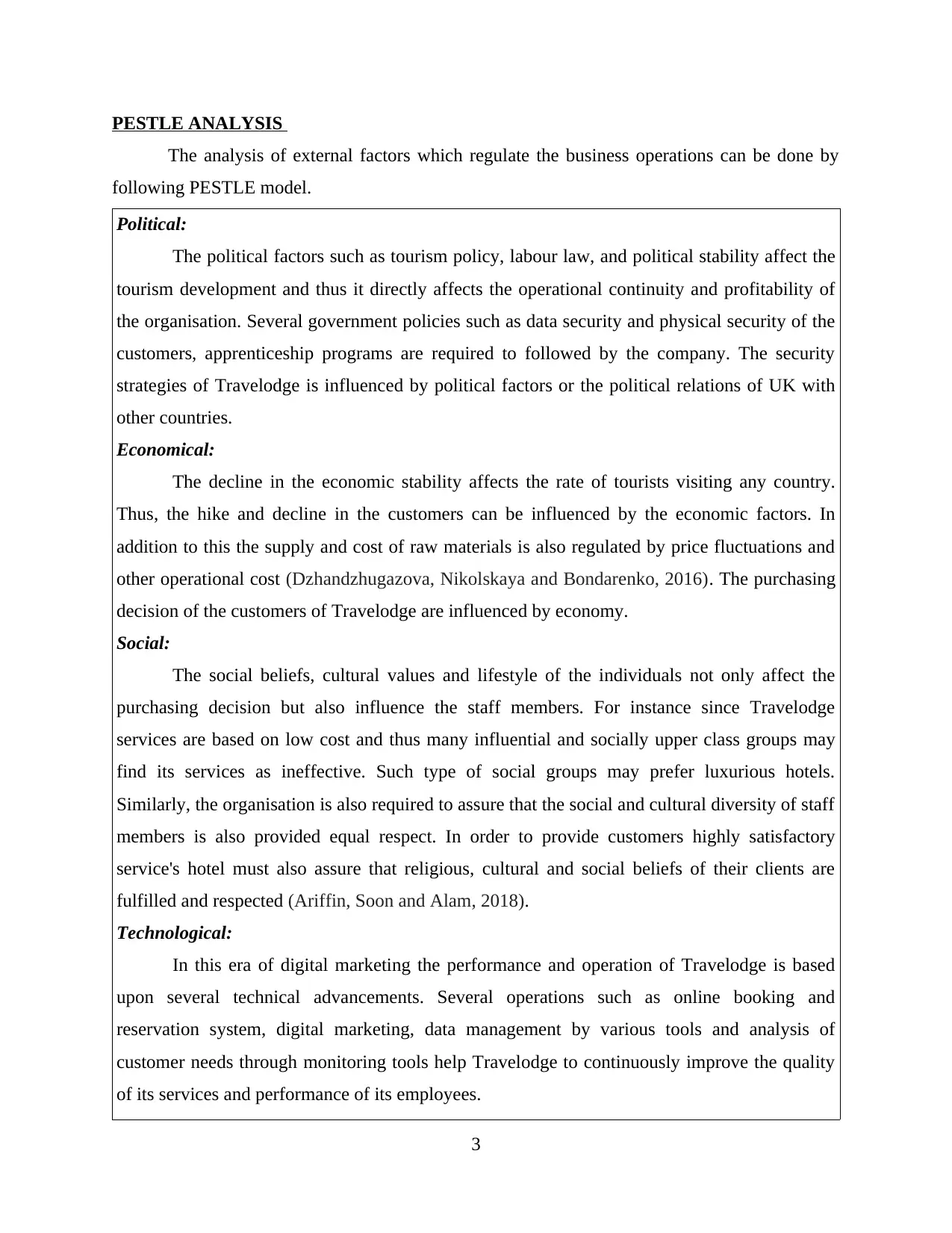
PESTLE ANALYSIS
The analysis of external factors which regulate the business operations can be done by
following PESTLE model.
Political:
The political factors such as tourism policy, labour law, and political stability affect the
tourism development and thus it directly affects the operational continuity and profitability of
the organisation. Several government policies such as data security and physical security of the
customers, apprenticeship programs are required to followed by the company. The security
strategies of Travelodge is influenced by political factors or the political relations of UK with
other countries.
Economical:
The decline in the economic stability affects the rate of tourists visiting any country.
Thus, the hike and decline in the customers can be influenced by the economic factors. In
addition to this the supply and cost of raw materials is also regulated by price fluctuations and
other operational cost (Dzhandzhugazova, Nikolskaya and Bondarenko, 2016). The purchasing
decision of the customers of Travelodge are influenced by economy.
Social:
The social beliefs, cultural values and lifestyle of the individuals not only affect the
purchasing decision but also influence the staff members. For instance since Travelodge
services are based on low cost and thus many influential and socially upper class groups may
find its services as ineffective. Such type of social groups may prefer luxurious hotels.
Similarly, the organisation is also required to assure that the social and cultural diversity of staff
members is also provided equal respect. In order to provide customers highly satisfactory
service's hotel must also assure that religious, cultural and social beliefs of their clients are
fulfilled and respected (Ariffin, Soon and Alam, 2018).
Technological:
In this era of digital marketing the performance and operation of Travelodge is based
upon several technical advancements. Several operations such as online booking and
reservation system, digital marketing, data management by various tools and analysis of
customer needs through monitoring tools help Travelodge to continuously improve the quality
of its services and performance of its employees.
3
The analysis of external factors which regulate the business operations can be done by
following PESTLE model.
Political:
The political factors such as tourism policy, labour law, and political stability affect the
tourism development and thus it directly affects the operational continuity and profitability of
the organisation. Several government policies such as data security and physical security of the
customers, apprenticeship programs are required to followed by the company. The security
strategies of Travelodge is influenced by political factors or the political relations of UK with
other countries.
Economical:
The decline in the economic stability affects the rate of tourists visiting any country.
Thus, the hike and decline in the customers can be influenced by the economic factors. In
addition to this the supply and cost of raw materials is also regulated by price fluctuations and
other operational cost (Dzhandzhugazova, Nikolskaya and Bondarenko, 2016). The purchasing
decision of the customers of Travelodge are influenced by economy.
Social:
The social beliefs, cultural values and lifestyle of the individuals not only affect the
purchasing decision but also influence the staff members. For instance since Travelodge
services are based on low cost and thus many influential and socially upper class groups may
find its services as ineffective. Such type of social groups may prefer luxurious hotels.
Similarly, the organisation is also required to assure that the social and cultural diversity of staff
members is also provided equal respect. In order to provide customers highly satisfactory
service's hotel must also assure that religious, cultural and social beliefs of their clients are
fulfilled and respected (Ariffin, Soon and Alam, 2018).
Technological:
In this era of digital marketing the performance and operation of Travelodge is based
upon several technical advancements. Several operations such as online booking and
reservation system, digital marketing, data management by various tools and analysis of
customer needs through monitoring tools help Travelodge to continuously improve the quality
of its services and performance of its employees.
3
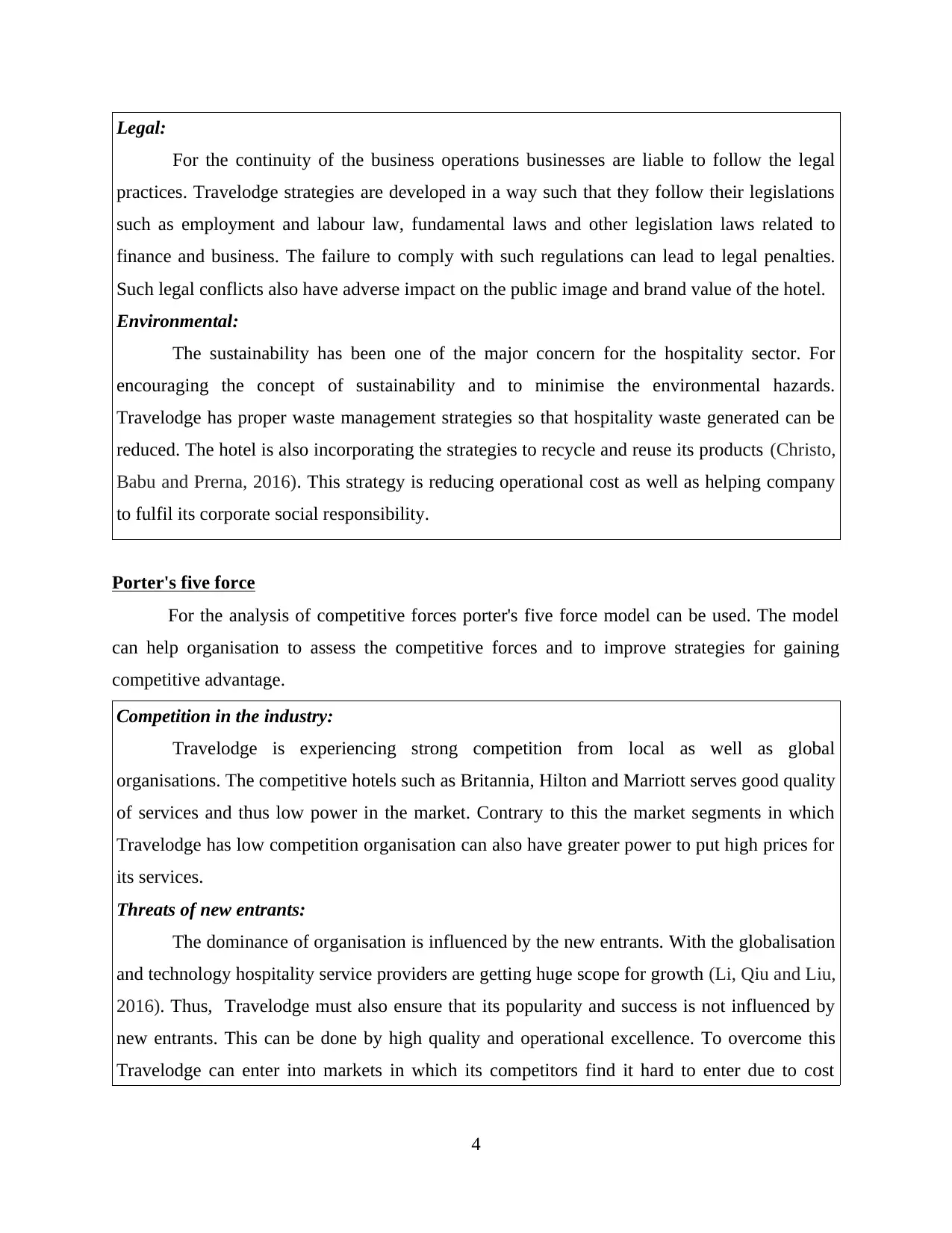
Legal:
For the continuity of the business operations businesses are liable to follow the legal
practices. Travelodge strategies are developed in a way such that they follow their legislations
such as employment and labour law, fundamental laws and other legislation laws related to
finance and business. The failure to comply with such regulations can lead to legal penalties.
Such legal conflicts also have adverse impact on the public image and brand value of the hotel.
Environmental:
The sustainability has been one of the major concern for the hospitality sector. For
encouraging the concept of sustainability and to minimise the environmental hazards.
Travelodge has proper waste management strategies so that hospitality waste generated can be
reduced. The hotel is also incorporating the strategies to recycle and reuse its products (Christo,
Babu and Prerna, 2016). This strategy is reducing operational cost as well as helping company
to fulfil its corporate social responsibility.
Porter's five force
For the analysis of competitive forces porter's five force model can be used. The model
can help organisation to assess the competitive forces and to improve strategies for gaining
competitive advantage.
Competition in the industry:
Travelodge is experiencing strong competition from local as well as global
organisations. The competitive hotels such as Britannia, Hilton and Marriott serves good quality
of services and thus low power in the market. Contrary to this the market segments in which
Travelodge has low competition organisation can also have greater power to put high prices for
its services.
Threats of new entrants:
The dominance of organisation is influenced by the new entrants. With the globalisation
and technology hospitality service providers are getting huge scope for growth (Li, Qiu and Liu,
2016). Thus, Travelodge must also ensure that its popularity and success is not influenced by
new entrants. This can be done by high quality and operational excellence. To overcome this
Travelodge can enter into markets in which its competitors find it hard to enter due to cost
4
For the continuity of the business operations businesses are liable to follow the legal
practices. Travelodge strategies are developed in a way such that they follow their legislations
such as employment and labour law, fundamental laws and other legislation laws related to
finance and business. The failure to comply with such regulations can lead to legal penalties.
Such legal conflicts also have adverse impact on the public image and brand value of the hotel.
Environmental:
The sustainability has been one of the major concern for the hospitality sector. For
encouraging the concept of sustainability and to minimise the environmental hazards.
Travelodge has proper waste management strategies so that hospitality waste generated can be
reduced. The hotel is also incorporating the strategies to recycle and reuse its products (Christo,
Babu and Prerna, 2016). This strategy is reducing operational cost as well as helping company
to fulfil its corporate social responsibility.
Porter's five force
For the analysis of competitive forces porter's five force model can be used. The model
can help organisation to assess the competitive forces and to improve strategies for gaining
competitive advantage.
Competition in the industry:
Travelodge is experiencing strong competition from local as well as global
organisations. The competitive hotels such as Britannia, Hilton and Marriott serves good quality
of services and thus low power in the market. Contrary to this the market segments in which
Travelodge has low competition organisation can also have greater power to put high prices for
its services.
Threats of new entrants:
The dominance of organisation is influenced by the new entrants. With the globalisation
and technology hospitality service providers are getting huge scope for growth (Li, Qiu and Liu,
2016). Thus, Travelodge must also ensure that its popularity and success is not influenced by
new entrants. This can be done by high quality and operational excellence. To overcome this
Travelodge can enter into markets in which its competitors find it hard to enter due to cost
4
⊘ This is a preview!⊘
Do you want full access?
Subscribe today to unlock all pages.

Trusted by 1+ million students worldwide
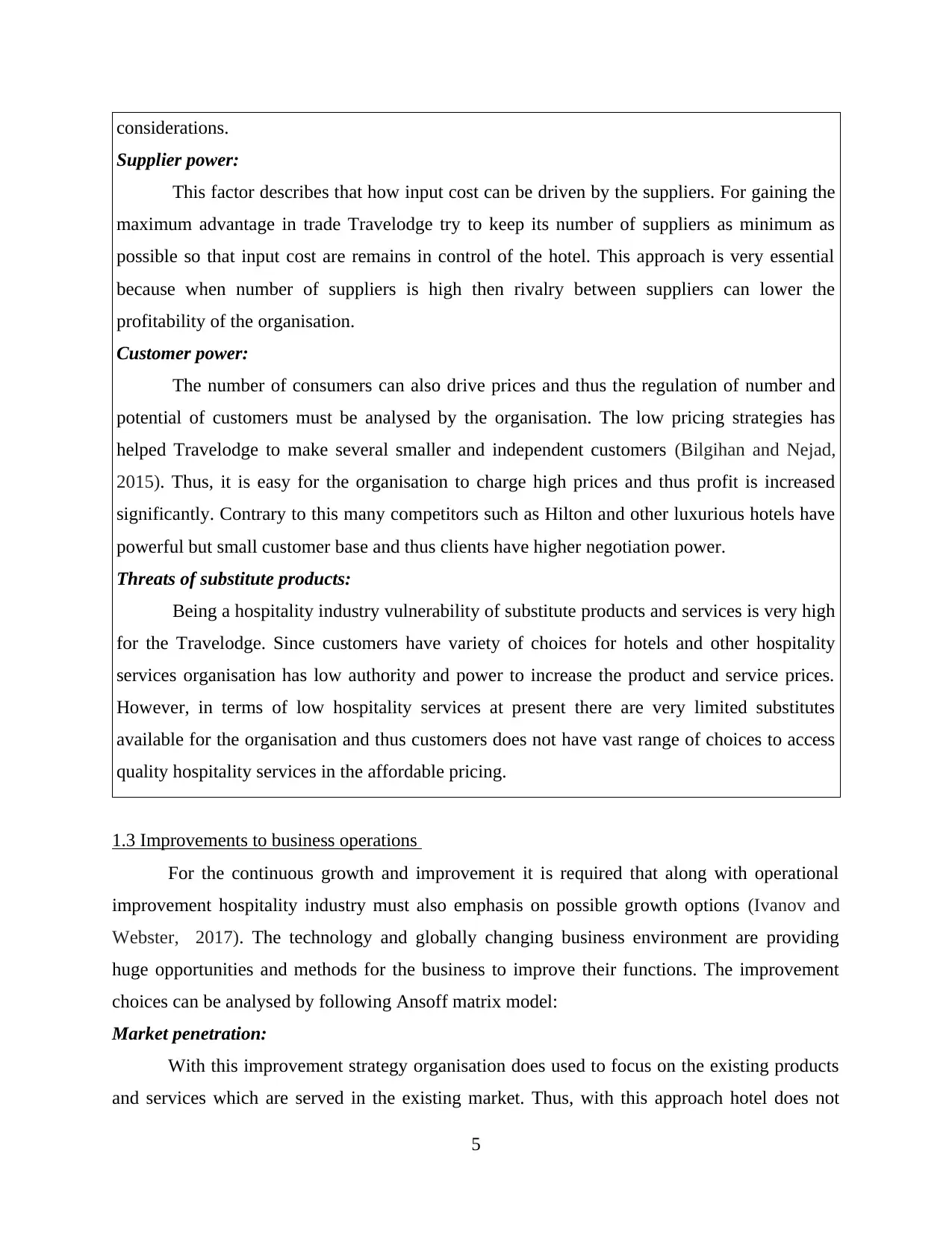
considerations.
Supplier power:
This factor describes that how input cost can be driven by the suppliers. For gaining the
maximum advantage in trade Travelodge try to keep its number of suppliers as minimum as
possible so that input cost are remains in control of the hotel. This approach is very essential
because when number of suppliers is high then rivalry between suppliers can lower the
profitability of the organisation.
Customer power:
The number of consumers can also drive prices and thus the regulation of number and
potential of customers must be analysed by the organisation. The low pricing strategies has
helped Travelodge to make several smaller and independent customers (Bilgihan and Nejad,
2015). Thus, it is easy for the organisation to charge high prices and thus profit is increased
significantly. Contrary to this many competitors such as Hilton and other luxurious hotels have
powerful but small customer base and thus clients have higher negotiation power.
Threats of substitute products:
Being a hospitality industry vulnerability of substitute products and services is very high
for the Travelodge. Since customers have variety of choices for hotels and other hospitality
services organisation has low authority and power to increase the product and service prices.
However, in terms of low hospitality services at present there are very limited substitutes
available for the organisation and thus customers does not have vast range of choices to access
quality hospitality services in the affordable pricing.
1.3 Improvements to business operations
For the continuous growth and improvement it is required that along with operational
improvement hospitality industry must also emphasis on possible growth options (Ivanov and
Webster, 2017). The technology and globally changing business environment are providing
huge opportunities and methods for the business to improve their functions. The improvement
choices can be analysed by following Ansoff matrix model:
Market penetration:
With this improvement strategy organisation does used to focus on the existing products
and services which are served in the existing market. Thus, with this approach hotel does not
5
Supplier power:
This factor describes that how input cost can be driven by the suppliers. For gaining the
maximum advantage in trade Travelodge try to keep its number of suppliers as minimum as
possible so that input cost are remains in control of the hotel. This approach is very essential
because when number of suppliers is high then rivalry between suppliers can lower the
profitability of the organisation.
Customer power:
The number of consumers can also drive prices and thus the regulation of number and
potential of customers must be analysed by the organisation. The low pricing strategies has
helped Travelodge to make several smaller and independent customers (Bilgihan and Nejad,
2015). Thus, it is easy for the organisation to charge high prices and thus profit is increased
significantly. Contrary to this many competitors such as Hilton and other luxurious hotels have
powerful but small customer base and thus clients have higher negotiation power.
Threats of substitute products:
Being a hospitality industry vulnerability of substitute products and services is very high
for the Travelodge. Since customers have variety of choices for hotels and other hospitality
services organisation has low authority and power to increase the product and service prices.
However, in terms of low hospitality services at present there are very limited substitutes
available for the organisation and thus customers does not have vast range of choices to access
quality hospitality services in the affordable pricing.
1.3 Improvements to business operations
For the continuous growth and improvement it is required that along with operational
improvement hospitality industry must also emphasis on possible growth options (Ivanov and
Webster, 2017). The technology and globally changing business environment are providing
huge opportunities and methods for the business to improve their functions. The improvement
choices can be analysed by following Ansoff matrix model:
Market penetration:
With this improvement strategy organisation does used to focus on the existing products
and services which are served in the existing market. Thus, with this approach hotel does not
5
Paraphrase This Document
Need a fresh take? Get an instant paraphrase of this document with our AI Paraphraser
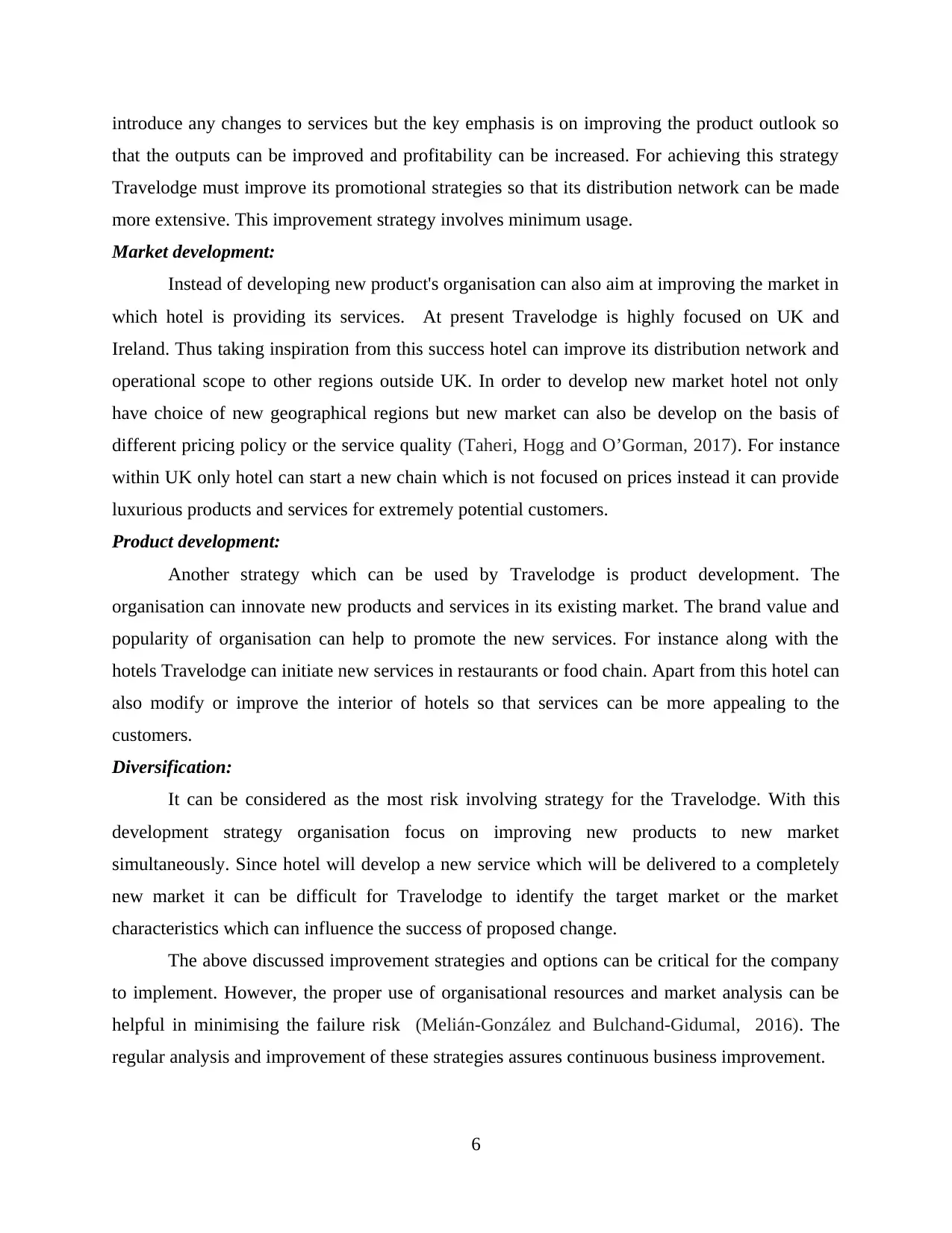
introduce any changes to services but the key emphasis is on improving the product outlook so
that the outputs can be improved and profitability can be increased. For achieving this strategy
Travelodge must improve its promotional strategies so that its distribution network can be made
more extensive. This improvement strategy involves minimum usage.
Market development:
Instead of developing new product's organisation can also aim at improving the market in
which hotel is providing its services. At present Travelodge is highly focused on UK and
Ireland. Thus taking inspiration from this success hotel can improve its distribution network and
operational scope to other regions outside UK. In order to develop new market hotel not only
have choice of new geographical regions but new market can also be develop on the basis of
different pricing policy or the service quality (Taheri, Hogg and O’Gorman, 2017). For instance
within UK only hotel can start a new chain which is not focused on prices instead it can provide
luxurious products and services for extremely potential customers.
Product development:
Another strategy which can be used by Travelodge is product development. The
organisation can innovate new products and services in its existing market. The brand value and
popularity of organisation can help to promote the new services. For instance along with the
hotels Travelodge can initiate new services in restaurants or food chain. Apart from this hotel can
also modify or improve the interior of hotels so that services can be more appealing to the
customers.
Diversification:
It can be considered as the most risk involving strategy for the Travelodge. With this
development strategy organisation focus on improving new products to new market
simultaneously. Since hotel will develop a new service which will be delivered to a completely
new market it can be difficult for Travelodge to identify the target market or the market
characteristics which can influence the success of proposed change.
The above discussed improvement strategies and options can be critical for the company
to implement. However, the proper use of organisational resources and market analysis can be
helpful in minimising the failure risk (Melián-González and Bulchand-Gidumal, 2016). The
regular analysis and improvement of these strategies assures continuous business improvement.
6
that the outputs can be improved and profitability can be increased. For achieving this strategy
Travelodge must improve its promotional strategies so that its distribution network can be made
more extensive. This improvement strategy involves minimum usage.
Market development:
Instead of developing new product's organisation can also aim at improving the market in
which hotel is providing its services. At present Travelodge is highly focused on UK and
Ireland. Thus taking inspiration from this success hotel can improve its distribution network and
operational scope to other regions outside UK. In order to develop new market hotel not only
have choice of new geographical regions but new market can also be develop on the basis of
different pricing policy or the service quality (Taheri, Hogg and O’Gorman, 2017). For instance
within UK only hotel can start a new chain which is not focused on prices instead it can provide
luxurious products and services for extremely potential customers.
Product development:
Another strategy which can be used by Travelodge is product development. The
organisation can innovate new products and services in its existing market. The brand value and
popularity of organisation can help to promote the new services. For instance along with the
hotels Travelodge can initiate new services in restaurants or food chain. Apart from this hotel can
also modify or improve the interior of hotels so that services can be more appealing to the
customers.
Diversification:
It can be considered as the most risk involving strategy for the Travelodge. With this
development strategy organisation focus on improving new products to new market
simultaneously. Since hotel will develop a new service which will be delivered to a completely
new market it can be difficult for Travelodge to identify the target market or the market
characteristics which can influence the success of proposed change.
The above discussed improvement strategies and options can be critical for the company
to implement. However, the proper use of organisational resources and market analysis can be
helpful in minimising the failure risk (Melián-González and Bulchand-Gidumal, 2016). The
regular analysis and improvement of these strategies assures continuous business improvement.
6
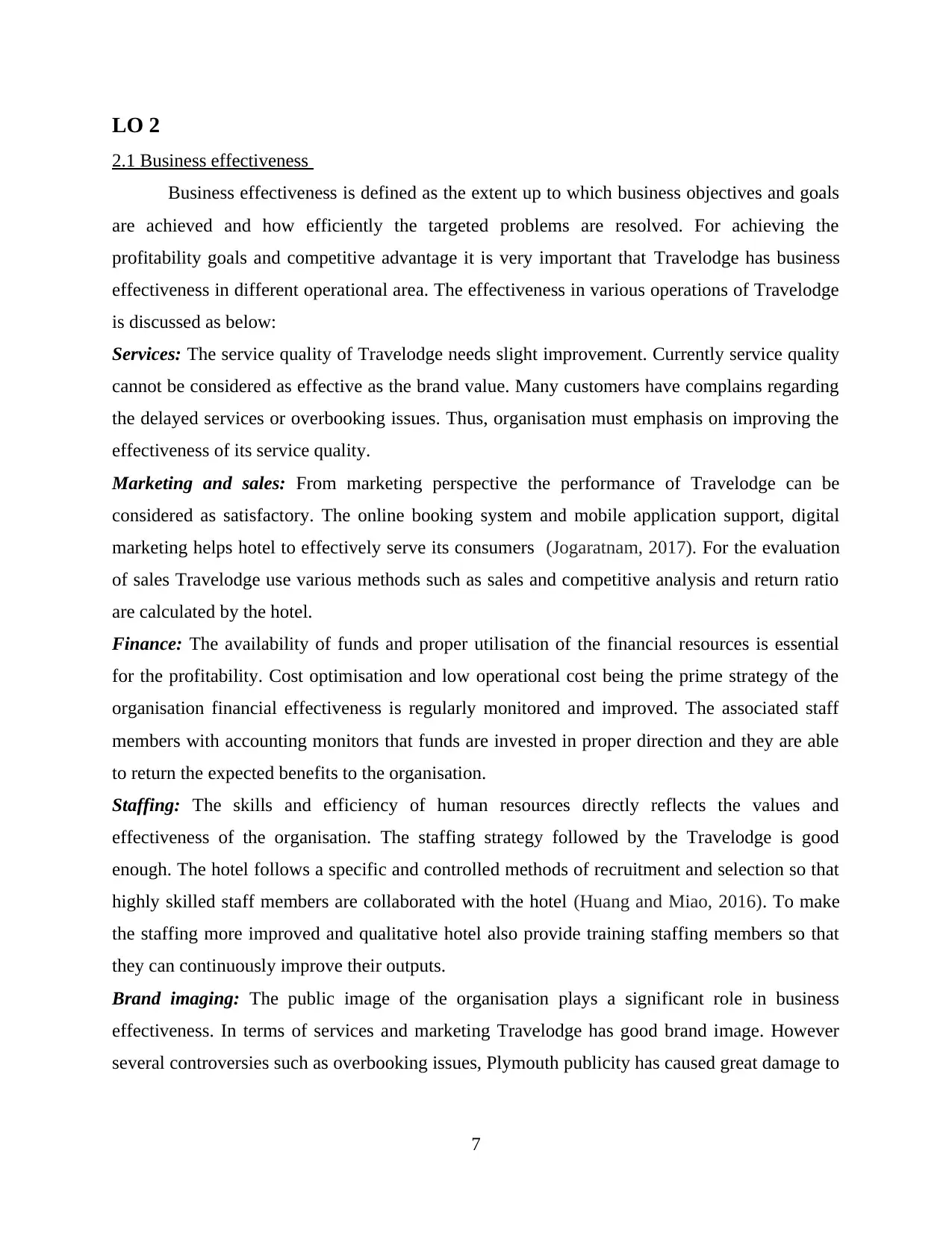
LO 2
2.1 Business effectiveness
Business effectiveness is defined as the extent up to which business objectives and goals
are achieved and how efficiently the targeted problems are resolved. For achieving the
profitability goals and competitive advantage it is very important that Travelodge has business
effectiveness in different operational area. The effectiveness in various operations of Travelodge
is discussed as below:
Services: The service quality of Travelodge needs slight improvement. Currently service quality
cannot be considered as effective as the brand value. Many customers have complains regarding
the delayed services or overbooking issues. Thus, organisation must emphasis on improving the
effectiveness of its service quality.
Marketing and sales: From marketing perspective the performance of Travelodge can be
considered as satisfactory. The online booking system and mobile application support, digital
marketing helps hotel to effectively serve its consumers (Jogaratnam, 2017). For the evaluation
of sales Travelodge use various methods such as sales and competitive analysis and return ratio
are calculated by the hotel.
Finance: The availability of funds and proper utilisation of the financial resources is essential
for the profitability. Cost optimisation and low operational cost being the prime strategy of the
organisation financial effectiveness is regularly monitored and improved. The associated staff
members with accounting monitors that funds are invested in proper direction and they are able
to return the expected benefits to the organisation.
Staffing: The skills and efficiency of human resources directly reflects the values and
effectiveness of the organisation. The staffing strategy followed by the Travelodge is good
enough. The hotel follows a specific and controlled methods of recruitment and selection so that
highly skilled staff members are collaborated with the hotel (Huang and Miao, 2016). To make
the staffing more improved and qualitative hotel also provide training staffing members so that
they can continuously improve their outputs.
Brand imaging: The public image of the organisation plays a significant role in business
effectiveness. In terms of services and marketing Travelodge has good brand image. However
several controversies such as overbooking issues, Plymouth publicity has caused great damage to
7
2.1 Business effectiveness
Business effectiveness is defined as the extent up to which business objectives and goals
are achieved and how efficiently the targeted problems are resolved. For achieving the
profitability goals and competitive advantage it is very important that Travelodge has business
effectiveness in different operational area. The effectiveness in various operations of Travelodge
is discussed as below:
Services: The service quality of Travelodge needs slight improvement. Currently service quality
cannot be considered as effective as the brand value. Many customers have complains regarding
the delayed services or overbooking issues. Thus, organisation must emphasis on improving the
effectiveness of its service quality.
Marketing and sales: From marketing perspective the performance of Travelodge can be
considered as satisfactory. The online booking system and mobile application support, digital
marketing helps hotel to effectively serve its consumers (Jogaratnam, 2017). For the evaluation
of sales Travelodge use various methods such as sales and competitive analysis and return ratio
are calculated by the hotel.
Finance: The availability of funds and proper utilisation of the financial resources is essential
for the profitability. Cost optimisation and low operational cost being the prime strategy of the
organisation financial effectiveness is regularly monitored and improved. The associated staff
members with accounting monitors that funds are invested in proper direction and they are able
to return the expected benefits to the organisation.
Staffing: The skills and efficiency of human resources directly reflects the values and
effectiveness of the organisation. The staffing strategy followed by the Travelodge is good
enough. The hotel follows a specific and controlled methods of recruitment and selection so that
highly skilled staff members are collaborated with the hotel (Huang and Miao, 2016). To make
the staffing more improved and qualitative hotel also provide training staffing members so that
they can continuously improve their outputs.
Brand imaging: The public image of the organisation plays a significant role in business
effectiveness. In terms of services and marketing Travelodge has good brand image. However
several controversies such as overbooking issues, Plymouth publicity has caused great damage to
7
⊘ This is a preview!⊘
Do you want full access?
Subscribe today to unlock all pages.

Trusted by 1+ million students worldwide
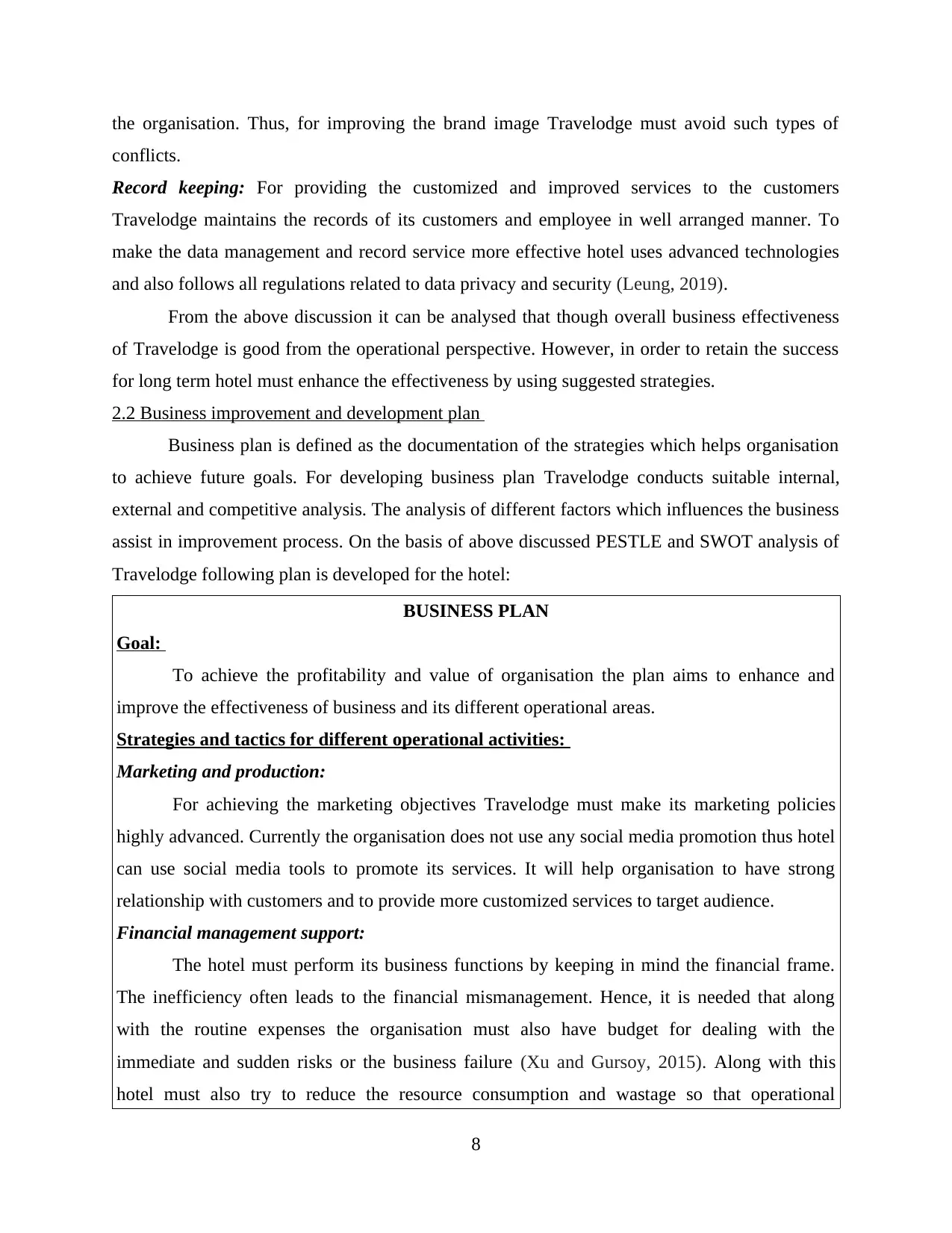
the organisation. Thus, for improving the brand image Travelodge must avoid such types of
conflicts.
Record keeping: For providing the customized and improved services to the customers
Travelodge maintains the records of its customers and employee in well arranged manner. To
make the data management and record service more effective hotel uses advanced technologies
and also follows all regulations related to data privacy and security (Leung, 2019).
From the above discussion it can be analysed that though overall business effectiveness
of Travelodge is good from the operational perspective. However, in order to retain the success
for long term hotel must enhance the effectiveness by using suggested strategies.
2.2 Business improvement and development plan
Business plan is defined as the documentation of the strategies which helps organisation
to achieve future goals. For developing business plan Travelodge conducts suitable internal,
external and competitive analysis. The analysis of different factors which influences the business
assist in improvement process. On the basis of above discussed PESTLE and SWOT analysis of
Travelodge following plan is developed for the hotel:
BUSINESS PLAN
Goal:
To achieve the profitability and value of organisation the plan aims to enhance and
improve the effectiveness of business and its different operational areas.
Strategies and tactics for different operational activities:
Marketing and production:
For achieving the marketing objectives Travelodge must make its marketing policies
highly advanced. Currently the organisation does not use any social media promotion thus hotel
can use social media tools to promote its services. It will help organisation to have strong
relationship with customers and to provide more customized services to target audience.
Financial management support:
The hotel must perform its business functions by keeping in mind the financial frame.
The inefficiency often leads to the financial mismanagement. Hence, it is needed that along
with the routine expenses the organisation must also have budget for dealing with the
immediate and sudden risks or the business failure (Xu and Gursoy, 2015). Along with this
hotel must also try to reduce the resource consumption and wastage so that operational
8
conflicts.
Record keeping: For providing the customized and improved services to the customers
Travelodge maintains the records of its customers and employee in well arranged manner. To
make the data management and record service more effective hotel uses advanced technologies
and also follows all regulations related to data privacy and security (Leung, 2019).
From the above discussion it can be analysed that though overall business effectiveness
of Travelodge is good from the operational perspective. However, in order to retain the success
for long term hotel must enhance the effectiveness by using suggested strategies.
2.2 Business improvement and development plan
Business plan is defined as the documentation of the strategies which helps organisation
to achieve future goals. For developing business plan Travelodge conducts suitable internal,
external and competitive analysis. The analysis of different factors which influences the business
assist in improvement process. On the basis of above discussed PESTLE and SWOT analysis of
Travelodge following plan is developed for the hotel:
BUSINESS PLAN
Goal:
To achieve the profitability and value of organisation the plan aims to enhance and
improve the effectiveness of business and its different operational areas.
Strategies and tactics for different operational activities:
Marketing and production:
For achieving the marketing objectives Travelodge must make its marketing policies
highly advanced. Currently the organisation does not use any social media promotion thus hotel
can use social media tools to promote its services. It will help organisation to have strong
relationship with customers and to provide more customized services to target audience.
Financial management support:
The hotel must perform its business functions by keeping in mind the financial frame.
The inefficiency often leads to the financial mismanagement. Hence, it is needed that along
with the routine expenses the organisation must also have budget for dealing with the
immediate and sudden risks or the business failure (Xu and Gursoy, 2015). Along with this
hotel must also try to reduce the resource consumption and wastage so that operational
8
Paraphrase This Document
Need a fresh take? Get an instant paraphrase of this document with our AI Paraphraser
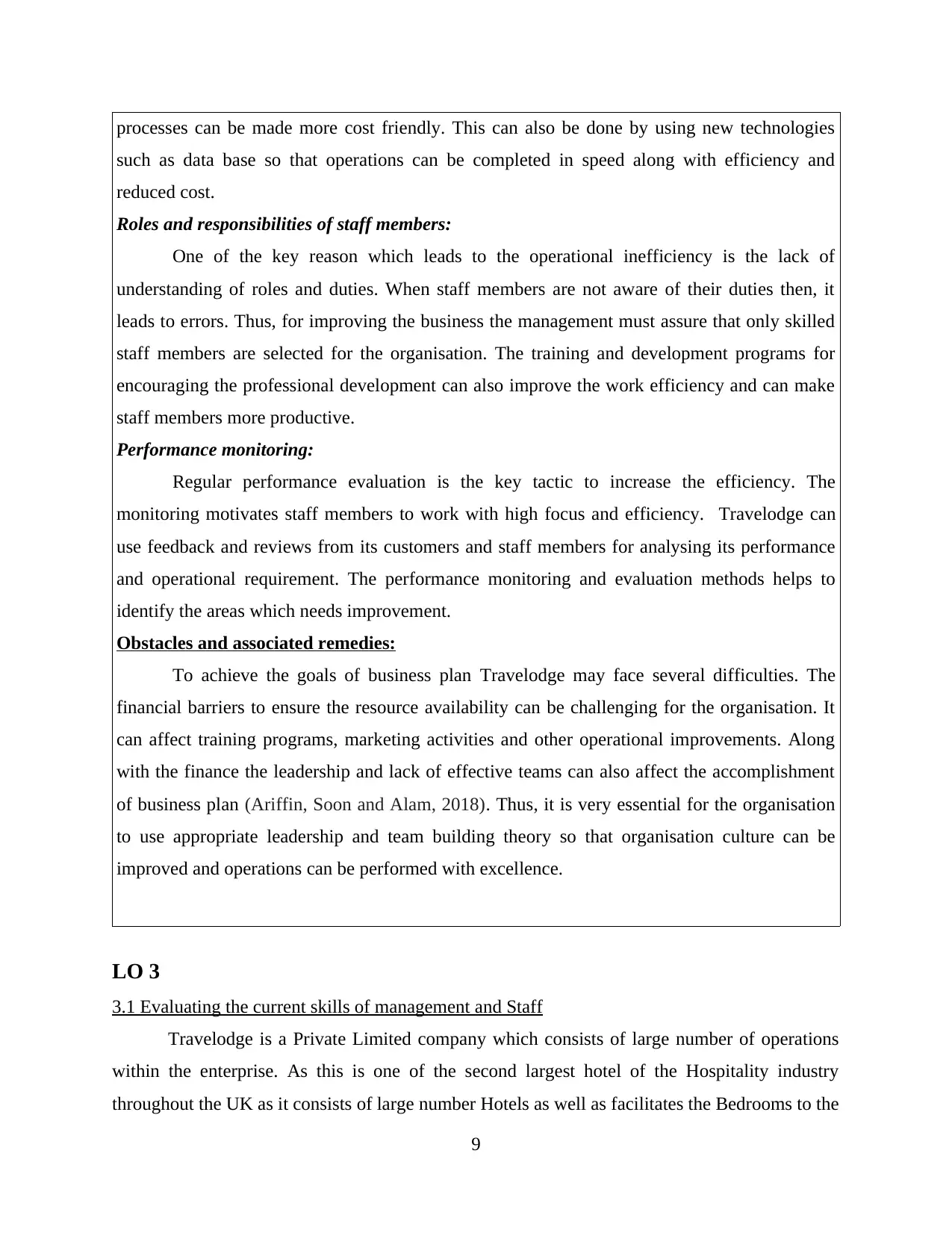
processes can be made more cost friendly. This can also be done by using new technologies
such as data base so that operations can be completed in speed along with efficiency and
reduced cost.
Roles and responsibilities of staff members:
One of the key reason which leads to the operational inefficiency is the lack of
understanding of roles and duties. When staff members are not aware of their duties then, it
leads to errors. Thus, for improving the business the management must assure that only skilled
staff members are selected for the organisation. The training and development programs for
encouraging the professional development can also improve the work efficiency and can make
staff members more productive.
Performance monitoring:
Regular performance evaluation is the key tactic to increase the efficiency. The
monitoring motivates staff members to work with high focus and efficiency. Travelodge can
use feedback and reviews from its customers and staff members for analysing its performance
and operational requirement. The performance monitoring and evaluation methods helps to
identify the areas which needs improvement.
Obstacles and associated remedies:
To achieve the goals of business plan Travelodge may face several difficulties. The
financial barriers to ensure the resource availability can be challenging for the organisation. It
can affect training programs, marketing activities and other operational improvements. Along
with the finance the leadership and lack of effective teams can also affect the accomplishment
of business plan (Ariffin, Soon and Alam, 2018). Thus, it is very essential for the organisation
to use appropriate leadership and team building theory so that organisation culture can be
improved and operations can be performed with excellence.
LO 3
3.1 Evaluating the current skills of management and Staff
Travelodge is a Private Limited company which consists of large number of operations
within the enterprise. As this is one of the second largest hotel of the Hospitality industry
throughout the UK as it consists of large number Hotels as well as facilitates the Bedrooms to the
9
such as data base so that operations can be completed in speed along with efficiency and
reduced cost.
Roles and responsibilities of staff members:
One of the key reason which leads to the operational inefficiency is the lack of
understanding of roles and duties. When staff members are not aware of their duties then, it
leads to errors. Thus, for improving the business the management must assure that only skilled
staff members are selected for the organisation. The training and development programs for
encouraging the professional development can also improve the work efficiency and can make
staff members more productive.
Performance monitoring:
Regular performance evaluation is the key tactic to increase the efficiency. The
monitoring motivates staff members to work with high focus and efficiency. Travelodge can
use feedback and reviews from its customers and staff members for analysing its performance
and operational requirement. The performance monitoring and evaluation methods helps to
identify the areas which needs improvement.
Obstacles and associated remedies:
To achieve the goals of business plan Travelodge may face several difficulties. The
financial barriers to ensure the resource availability can be challenging for the organisation. It
can affect training programs, marketing activities and other operational improvements. Along
with the finance the leadership and lack of effective teams can also affect the accomplishment
of business plan (Ariffin, Soon and Alam, 2018). Thus, it is very essential for the organisation
to use appropriate leadership and team building theory so that organisation culture can be
improved and operations can be performed with excellence.
LO 3
3.1 Evaluating the current skills of management and Staff
Travelodge is a Private Limited company which consists of large number of operations
within the enterprise. As this is one of the second largest hotel of the Hospitality industry
throughout the UK as it consists of large number Hotels as well as facilitates the Bedrooms to the
9
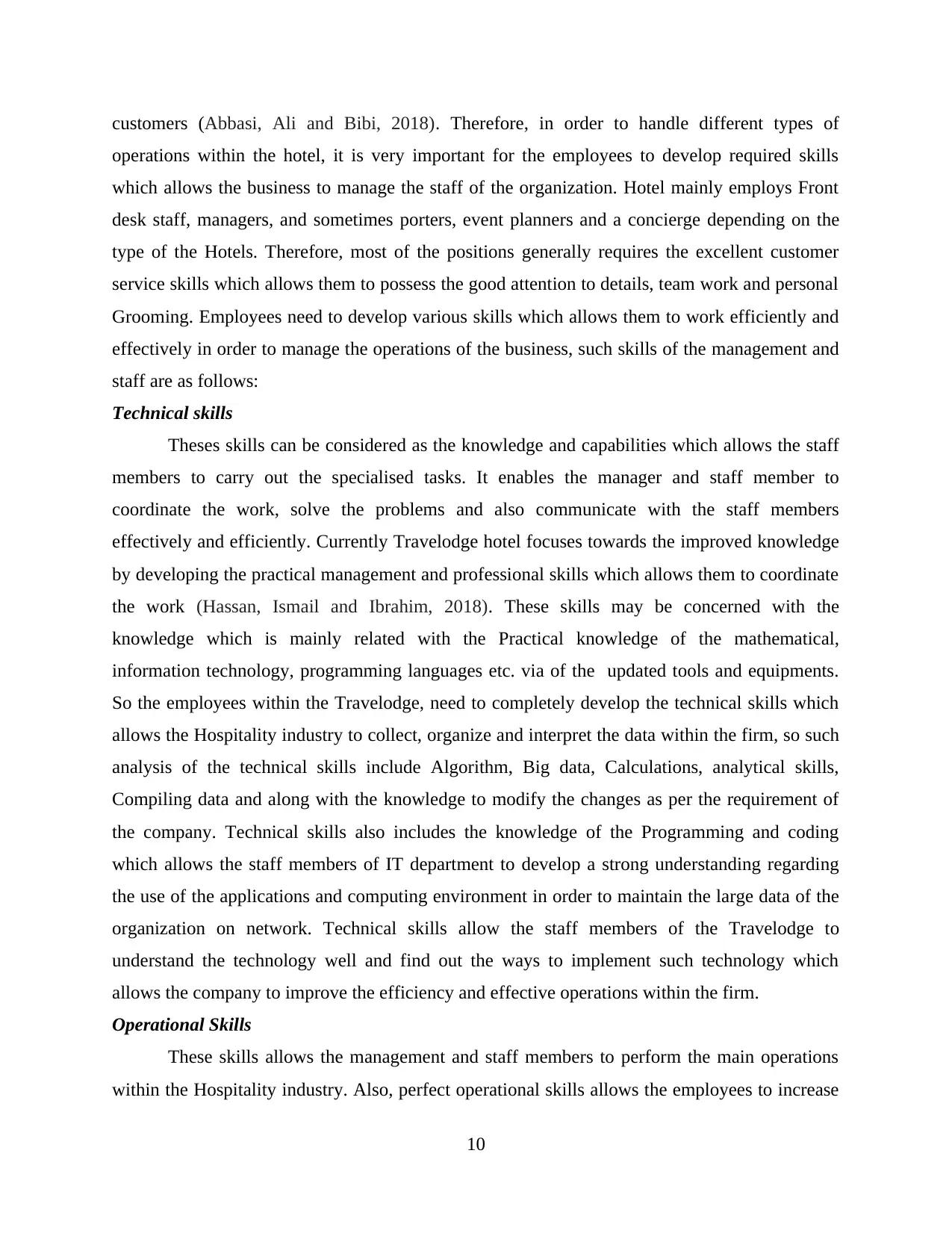
customers (Abbasi, Ali and Bibi, 2018). Therefore, in order to handle different types of
operations within the hotel, it is very important for the employees to develop required skills
which allows the business to manage the staff of the organization. Hotel mainly employs Front
desk staff, managers, and sometimes porters, event planners and a concierge depending on the
type of the Hotels. Therefore, most of the positions generally requires the excellent customer
service skills which allows them to possess the good attention to details, team work and personal
Grooming. Employees need to develop various skills which allows them to work efficiently and
effectively in order to manage the operations of the business, such skills of the management and
staff are as follows:
Technical skills
Theses skills can be considered as the knowledge and capabilities which allows the staff
members to carry out the specialised tasks. It enables the manager and staff member to
coordinate the work, solve the problems and also communicate with the staff members
effectively and efficiently. Currently Travelodge hotel focuses towards the improved knowledge
by developing the practical management and professional skills which allows them to coordinate
the work (Hassan, Ismail and Ibrahim, 2018). These skills may be concerned with the
knowledge which is mainly related with the Practical knowledge of the mathematical,
information technology, programming languages etc. via of the updated tools and equipments.
So the employees within the Travelodge, need to completely develop the technical skills which
allows the Hospitality industry to collect, organize and interpret the data within the firm, so such
analysis of the technical skills include Algorithm, Big data, Calculations, analytical skills,
Compiling data and along with the knowledge to modify the changes as per the requirement of
the company. Technical skills also includes the knowledge of the Programming and coding
which allows the staff members of IT department to develop a strong understanding regarding
the use of the applications and computing environment in order to maintain the large data of the
organization on network. Technical skills allow the staff members of the Travelodge to
understand the technology well and find out the ways to implement such technology which
allows the company to improve the efficiency and effective operations within the firm.
Operational Skills
These skills allows the management and staff members to perform the main operations
within the Hospitality industry. Also, perfect operational skills allows the employees to increase
10
operations within the hotel, it is very important for the employees to develop required skills
which allows the business to manage the staff of the organization. Hotel mainly employs Front
desk staff, managers, and sometimes porters, event planners and a concierge depending on the
type of the Hotels. Therefore, most of the positions generally requires the excellent customer
service skills which allows them to possess the good attention to details, team work and personal
Grooming. Employees need to develop various skills which allows them to work efficiently and
effectively in order to manage the operations of the business, such skills of the management and
staff are as follows:
Technical skills
Theses skills can be considered as the knowledge and capabilities which allows the staff
members to carry out the specialised tasks. It enables the manager and staff member to
coordinate the work, solve the problems and also communicate with the staff members
effectively and efficiently. Currently Travelodge hotel focuses towards the improved knowledge
by developing the practical management and professional skills which allows them to coordinate
the work (Hassan, Ismail and Ibrahim, 2018). These skills may be concerned with the
knowledge which is mainly related with the Practical knowledge of the mathematical,
information technology, programming languages etc. via of the updated tools and equipments.
So the employees within the Travelodge, need to completely develop the technical skills which
allows the Hospitality industry to collect, organize and interpret the data within the firm, so such
analysis of the technical skills include Algorithm, Big data, Calculations, analytical skills,
Compiling data and along with the knowledge to modify the changes as per the requirement of
the company. Technical skills also includes the knowledge of the Programming and coding
which allows the staff members of IT department to develop a strong understanding regarding
the use of the applications and computing environment in order to maintain the large data of the
organization on network. Technical skills allow the staff members of the Travelodge to
understand the technology well and find out the ways to implement such technology which
allows the company to improve the efficiency and effective operations within the firm.
Operational Skills
These skills allows the management and staff members to perform the main operations
within the Hospitality industry. Also, perfect operational skills allows the employees to increase
10
⊘ This is a preview!⊘
Do you want full access?
Subscribe today to unlock all pages.

Trusted by 1+ million students worldwide
1 out of 23
Related Documents
Your All-in-One AI-Powered Toolkit for Academic Success.
+13062052269
info@desklib.com
Available 24*7 on WhatsApp / Email
![[object Object]](/_next/static/media/star-bottom.7253800d.svg)
Unlock your academic potential
Copyright © 2020–2026 A2Z Services. All Rights Reserved. Developed and managed by ZUCOL.





